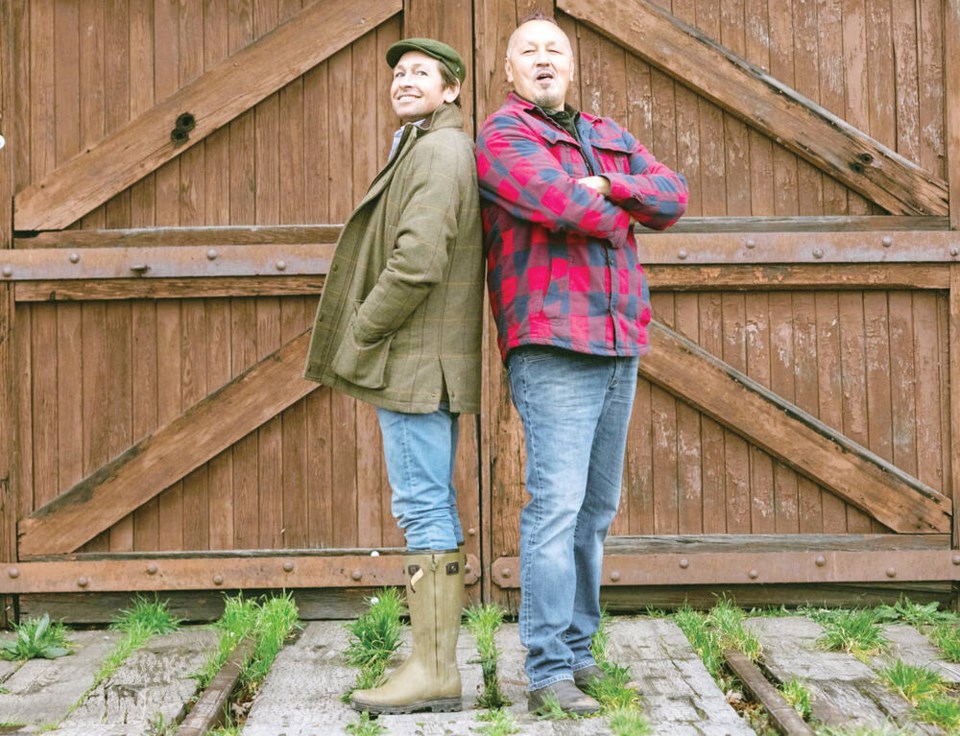On paper, the Victoria co-hosts of Moosemeat & Marmalade couldn’t be more different.
On one side, there’s Dan Hayes, a classically-trained French chef and educator from Britain who has worked in Michelin-starred restaurants throughout Europe. He’s the Marmalade portion of the reality show’s moniker. The Moosemeat refers to Art Napoleon, a Cree singer-songwriter and bush cook originally from Moberly Lake, B.C.
The unlikely pairing makes for good TV, and has resulted in a ratings windfall for Aboriginal Peoples Television Network, which has aired the fish-out-water, food-and-culture docuseries since 2015. Off screen, however, the two friends are more alike than viewers might imagine.
Time has bridged the gap between the two, Hayes said.
“At the start [of the series], it was clear: I’m the chef, and he’s the hunter. But very quickly it became less apparent. I also grew up hunting and fishing, and he’s a fabulous cook. The show would be very simple if I didn’t know what a gun was and he didn’t know what a kitchen was. We’re not actually that different.”
Locations for previous episodes were split between Canada, Europe and the United Kingdom. The upcoming 13-episode sixth season, which premieres tonight [Tuesday] and airs weekly on APTN, was shot entirely in Canada, due to pandemic protocols.
“I enjoyed it immensely,” Hayes said. “As romantic as Spain and Sweden are, I love being in communities here.”
The hometown influence looms large. Cowichan Lake and Salt Spring Island were among the shooting locations this season (Vancouver Island also makes several appearances in the show’s seventh season, which is currently being filmed and will air next year). Greater Victoria is featured prominently in Tuesday’s season opener, during which the co-hosts hunt — and eventually eat — grey squirrels.
Foraging for food in unlikely places is the foundation of the show, Hayes said. “There always has to be a reason [behind each episode]. We’re looking always at sustainability, conservation, and if we’re in a First Nations community, the tradition behind it all.”
Hayes and Napoleon both “strongly” believe in fishing and hunting as conservation tools, Hayes said, and the Moosemeat & Marmalade hosts of spend a good portion of each episode discussing the topic, frequently with First Nations elders. The show may be jarring for some. The prospect of hunting is not widely accepted among Victoria residents, many of whom consume vast amounts of fish but could never imagine killing and eating rabbit, squirrel, or black bear — as Napoleon and Hayes have done on episodes of the show.
Hayes said he sees Moosemeat & Marmalade as educational programming in that regard. “The accessibility to hunting and fishing and foraging for someone living in downtown Victoria is unbelievable. It doesn’t just happen — you have to make it a priority in your life. But it is unbelievably accessible, and unbelievably cheap. And that is something which has always blown me away, coming from the UK.”
Hayes and his wife ran the Victoria-based cooking school, The London Chef, for over 10 years, before moving the business exclusively online during the pandemic. Between episodes of Moosemeat & Marmalade and his popular cooking classes, he’s hoping to bring more people around to the farm-to-table, head-to-tail, zero-waste lifestyle.
“I’ve worked in amazing restaurants, but what I want to eat is seafood and wild game simply cooked over a fire. I haven’t eaten farmed meat for six years. Religiously, I don’t eat soup if it has chicken stock in it, I don’t eat marshmallows because they have gelatin in them.”
Everyone can make a similar switch, he added — if they are willing to put in the work.
“There’s the person who says there is no access, too much private land, deer numbers are down, too many regulations on guns, fishing regulations are hard, and boat fuel is too expensive. Because it takes a bit of time,” Hayes said.
“But you will get there eventually. All farmers need help controlling deer and geese and rabbits and ducks. And that doesn’t come overnight.”



